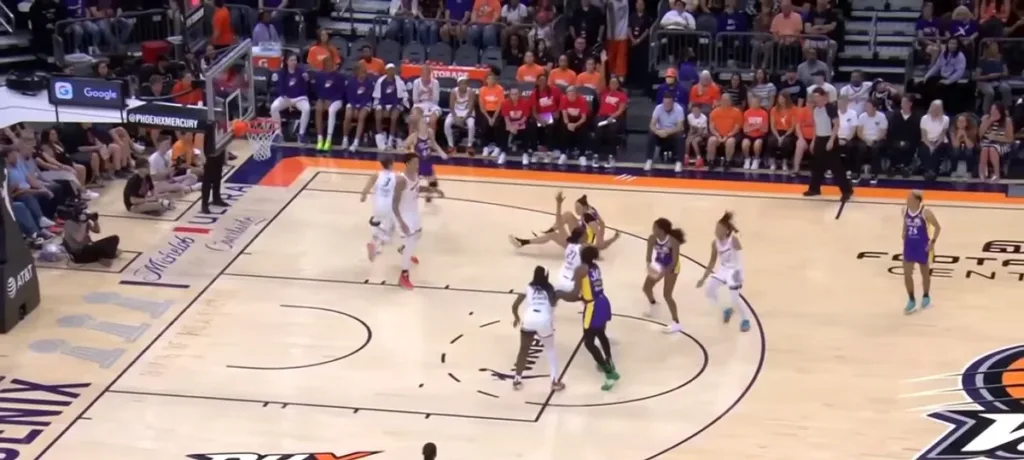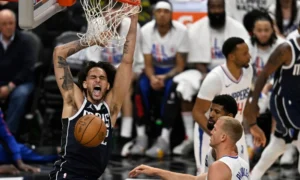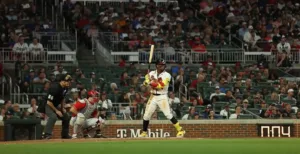What Is a Bonus in NBA?
Bonus in NBA refers to a specific rule that determines when a team will be awarded free throws due to fouls committed by the opposition.
Bonus in NBA refers to a specific rule that determines when a team will be awarded free throws due to fouls committed by the opposing team. When a team enters the bonus, the opposing team has committed a certain number of fouls within a given period, usually a quarter or half, that qualifies the fouled team to shoot free throws.
The bonus rule is applied differently in basketball leagues, including the NBA, WNBA, NCAA, high school, and international basketball.
Is the term “bonus” used in NCAA and high school basketball?
Yes, “bonus” is also used in NCAA and high school basketball. It operates similarly to the NBA, where teams are awarded free throws when the opposing team reaches the bonus. However, there may be slight variations in the number of fouls required to enter the bonus and the duration of the bonus period.
What is the difference between “bonus” in NBA and WNBA?

The main difference between the “bonus” in the NBA and WNBA lies in the number of team fouls required to enter the bonus. In the NBA, a team enters the bonus on the fifth team foul each quarter.
However, in the WNBA, a team enters the bonus on the fourth team foul each quarter. This is one of the differences in the rules between the two leagues.
What is the bonus rule in the NBA?
How does the bonus rule work in the NBA?
The bonus rule in the NBA kicks in when a team reaches several fouls in a quarter. When a team enters the bonus, they are awarded free throws on any subsequent defensive fouls committed by the opposing team.
If a player is fouled while shooting, they will be awarded two free throws if the foul was not a shooting foul and three free throws if it occurred during a shooting foul.
When does a team enter the bonus in NBA games?
In NBA games, a team enters the bonus on the fifth team foul each quarter. This means that once a team commits their fifth foul in a quarter, the opposing team will be awarded free throws on any subsequent defensive fouls.
It provides an advantage to the fouled team, as it allows them to score points without any interference from the defense.
How long does the bonus last in the NBA?
The bonus in NBA games lasts for the entire quarter, regardless of the time remaining. Once a team enters the bonus, they will continue to shoot free throws on any subsequent defensive fouls for the remainder of that quarter.
How many fouls are needed to enter the bonus in the NBA?
How many fouls does a team need to commit to entering the bonus in the NBA?
A team needs to commit five fouls in a quarter to enter the bonus in the NBA. Once a team has committed their fifth team foul, the opposing team will be awarded free throws on any subsequent defensive fouls.
What happens if a team commits more fouls than needed to enter the bonus?
If a team commits more fouls than needed to enter the bonus, it does not affect the number of free throws awarded to the opposing team.
Once a team has reached the bonus, any subsequent defensive fouls will still result in free throws for the opposing team, regardless of the number of fouls committed by the fouling team.
Do offensive fouls count towards the team fouls for the bonus?
No, offensive fouls do not count toward the team fouls for the bonus. Only defensive fouls committed by the defending team contribute to the team fouls.
Offensive fouls, such as charging or pushing off, do not result in free throws for the opposing team and do not count toward the team fouls.
What is the difference between a bonus and a double bonus in NBA?
How does the double bonus differ from the regular bonus in the NBA?
The double bonus in the NBA is used when a team has reached more fouls than the regular bonus. While the standard bonus is reached on the fifth team foul, the double bonus is reached on the tenth team foul in each quarter.
What happens if a team reaches the double bonus?
If a team reaches the double bonus, the opposing team will be awarded two free throws on any subsequent defensive fouls.
This gives the fouled team a more significant opportunity to score points, as they will have two free throws for each foul committed by the defending team.
How does the bonus rule apply in college basketball?
Is the bonus rule the same in college basketball as in the NBA?
The bonus rule in college basketball operates similarly as in the NBA. Once a team reaches a certain number of team fouls, they enter the bonus and are awarded free throws on any subsequent defensive fouls.
However, there may be slight differences in the specific number of fouls required to enter the bonus and the duration of the bonus period, depending on the college basketball league or division.
Are there any differences in the bonus rule between NCAA and high school basketball?
The bonus rule in NCAA basketball is generally the same as in high school basketball. Both leagues require a team to reach a specific number of team fouls to enter the bonus.
However, there may be variations in the number of fouls needed and the duration of the bonus period between high school basketball associations and NCAA divisions.
Can offensive fouls result in free throws in college basketball bonus situations?
Offensive fouls, such as charging or pushing off, do not result in free throws for the opposing team in college basketball bonus situations.
Only defensive fouls committed by the defending team contribute to the team fouls and result in free throws for the fouled team.
In college basketball, offensive fouls are considered turnovers, and the opposing team is awarded possession of the ball instead of free throws. This differs from the NBA, where offensive fouls count towards the team fouls for the bonus.
What is the bonus rule in international basketball?
How does the bonus rule differ in FIBA and NBA basketball?
The bonus rule in FIBA (International Basketball Federation) basketball differs slightly from the NBA.
In FIBA basketball, a team enters the bonus on the fourth team foul in each quarter, while in the NBA, it is the fifth team foul. This is one of the critical differences in the bonus rule between the two organizations.
Are there different rules regarding the bonus in international basketball?
While there are some differences in the bonus rule between FIBA and the NBA, the general concept remains the same.
A team enters the bonus after several team fouls and is awarded free throws on any subsequent defensive fouls.
The specific number of fouls required and the duration of the bonus period may vary depending on the level of international basketball and the particular tournament or competition.
What are the similarities and differences between the bonus in NBA and international basketball?
The NBA and international basketball use the bonus rule to provide an advantage to the fouled team by awarding them free throws. The main similarity is that a team enters the bonus after a certain number of team fouls.
However, the specific number of team fouls required and the duration of the bonus period may differ between the NBA and international basketball, depending on the governing body and particular tournament or competition rules.






